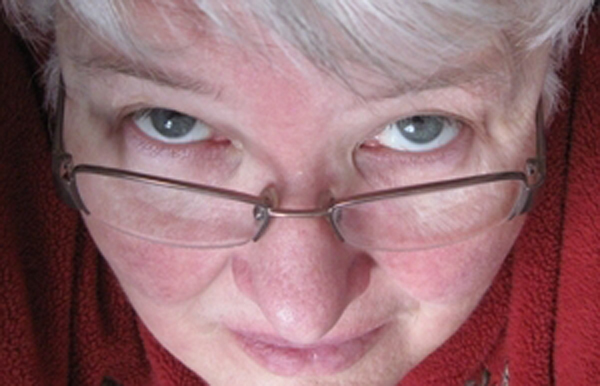“Prepare yourself mentally for sewing. Think about what you are going to do. Never approach sewing with a sigh or lackadaisically. Good results are difficult when indifference dominates. Never try to sew with a sink full of dirty dishes or beds unmade.”
That’s from the Singer Sewing Machine Manual. It was published in 1949, not long before I was launched into my youthful indoctrination on how to grow up to be a woman. The manual’s instructions continue:
“When there are urgent housekeeping chores, do these first so that your mind is free to enjoy your sewing. When you sew, make yourself as attractive as possible. Put on a clean dress. Keep a little bag of French chalk near your sewing machine to dust your fingers at intervals. Have your hair in order, powder and lipstick put on. If you are constantly fearful that a visitor might drop in or your husband will come home, and you will not look neatly put together, you will not enjoy your sewing.”
I retch. I’m hearing these words in the voice of Aunt Lydia of Handmaid’s Tale fame as she explains the rules that dominate women in the Republic of Gilead. I do not miss the overt suggestion that I should be “constantly fearful … [my] husband will come home” when I am not dressed up. What are the consequences? I will leave this to the gentle reader’s imagination.
Who reminded me of this advice – and yes, it is genuine, per fact-checker Snopes.com – was Margaret Atwood in an interview I recently watched via zoom. The topic was Burning Questions, her new book of essays.
The interviewer asked her to comment about the current abortion controversy in the United States. She had some telling comments. One was the common-sense observation that if society requires women to bear children, it is in fact engaging their services. Women conscripted for these services should have the same benefits and salaries as military recruits. Think about it: military personnel put their physical bodies at the service of the state; so do child-bearing women. Aren’t child-bearing and child-rearing a battle, in many ways?
Yes, of course, the circumstances surrounding childbirth are much more complex than simply remuneration. For most parents, having children is enormously rewarding and joyous, maybe the best experience in life. That has been my experience, too.
At the same time, as a single parent, I can tell you that balancing the hands-on care of a child with the need to make a living is overwhelming. Rigid workplace demands oppose essential child-rearing demands, and the scale on which one balances priorities simply breaks down.
The shortage of baby formula revealed to the world that only a quarter of babies in the United States are breastfed. In Canada, it’s about 34 percent by the age of six months, reported a study in the International Journal for Equity in Health, and many of the mothers who don’t nurse are economically disadvantaged. While the reasons for choosing not to nurse can vary, the necessity to work at a job that precludes nursing is a big one.
Then a shortage of baby formula happens, and the whole system breaks down. Who suffers the most? It’s a toss-up between the hungry baby and the mother desperately seeking to save her child.
Take away a woman’s right to make decisions about her own body and life, trap her in an impossible predicament, and you have the stuff that revolutions are made of: a hefty proportion of the population with nothing to lose.
I see the focus on regulating a woman’s body as a throw-back to the era of woman-as-chattel who must fearfully please her master, à la Singer Sewing Machine instructions.
Why is it hard for me to believe anti-abortion sentiment has anything to do with the life of the child? Because society arranges itself to care so little for that life after the child is born. As a village, we have failed our children and their mothers, in so many ways.
Well, that pretty much sums up why I don’t sew.
JUNE 24th CONCERT
Canterbury Center is to host a concert celebrating the Fête Nationale du Québec on Friday, June 24, at 8 p.m. Musicians Christian Nolet, Kevvin Hinse, and P.O. Boudreault will perform traditional music of Quebec on guitar, mandolin, violin, Irish bouzouki and voice.
Only 50 tickets will be sold. To be among the 50 lucky people in the audience, reserve your $15 seat by phoning Gilles Gaulin at 819-872-3273, or Ed Pedersen at 819-872-3400. Masks are suggested. Proceeds will help support the restoration of the Center’s small windows. The Canterbury Center is located at 1095 Route 214, Cantberbury.
“THREE R’S” FOR CANTERBURY
If you have good quality items that you would like to donate to the Canterbury Center fund-raising campaign, please call Tony De Melo at 819-872-3400 (leave a message) before July 15. Pick-up of items can be provided. All proceeds go to help restore the former Christchurch Canterbury, now Canterbury Center. The items will be on sale at the Canterbury Flea Market, July 30-31. Re-use, Re-cycle, Reduce!
CHURCHES
United. In-person Sunday services are in Cookshire at 9:30 a.m., and Sawyerville, 11 a.m., with Rev. Tami Spires. For service information, please check the United Eaton Valley Pastoral Charge answering machine at 819-889-2838.
Baptist. Regular in-persons services are in French at 9 a.m., in English at 11 a.m., respecting Covid protocols, including masks and hand sanitizing. For information, please contact Pastor Michel Houle at 819-239-8818.
Anglican. In-person service on Sunday, June 5, at 11 a.m., at St. Peter’s Church in Cookshire. Also, Bishop Bruce Myers offers Home Prayers at 4 p.m. on Sundays via Facebook, and at quebec.anglican.ca (Worship Videos). Info: 819-887-6802, or quebec.anglican.ca.
Do you have news to share? Call 819-640-1340 or email rawrites@gmail.com by May 30 for publication June 8 and by June 13 for June 22.
WHY I DON’T SEW

Article précédentDes travailleurs étrangers débarquent dans le Haut-Saint-François
